Natural Art Around The World: A Pairing Of Unknown And Famous National Parks
We may receive a commission on purchases made from links.

The Tunnel View of Yosemite National Park. Photo courtesy of Dawn Ellner.
Splotches of green, a sprinkle of pastels, rough and smooth textures stand in front of you. "What do you see?" prods the toothy character standing behind you. You turn, expecting to see the curator of your favorite museum; however, you're shocked back into reality, back into your hiking boots and dewy skin, as you watch Aunt Edith gaze across the Tunnel View of Yosemite National Park.
What do you see? Do you see turmoil in its jagged cliffs and tranquility in the streams? Here at Yosemite, digesting one of the millions of landscapes the amazing artist Earth created long before you ever entered the gallery which is this planet.
Just as artists produce a mix of extremely popular and unrecognizable (but still worth seeing) works, so does this planet when it comes to its national parks. In this article I hope to lure you in with the famous national parks, then seduce you with the neighboring off-the-beaten-path national parks.
California
Yosemite National Park
Yosemite National Park is cradled between Tuolumne River and South Fork Merced River on 747, 956 acres (302,687 hectares) in central California. As the third most visited national park in the United States its landscapes do not disappoint. Some of the classic scenes are the Tunnel View, Mariposa Grove, and El Capitan. During the summer approximately 14,000 visitors bask in the beauty of the Tunnel View, a popular viewpoint in Yosemite Valley. Mariposa Grove is an hour's drive south of Yosemite Valley; while among the tallest giant sequoias in the national park you can go beyond the parking lot with a hike or ski trip. At more than 3,000 feet (914 meters) high, El Capitan proudly holds the title of the largest granite monolith on Earth and is a hot-spot for rock climbers.
If you're a climber you really deserve to spend a good week — or three months — camping and climbing around Yosemite. Ditch the norm, find your inner dirtbag and join other climbers living simply to climb.
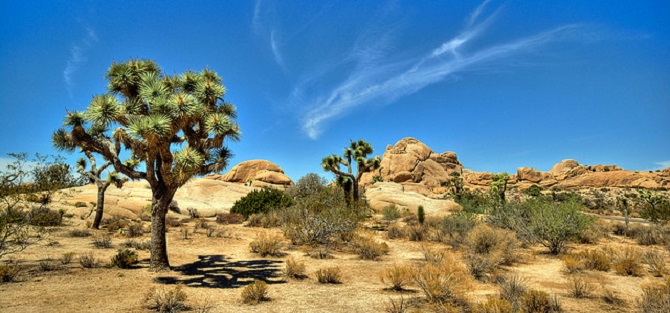
Joshua Tree National Park. Photo courtesy of Vicente Villamon.
Joshua Tree National Park
Speaking of rock climbing, Joshua Tree is six hours south of Yosemite, but does not get the same attention from tourists. Thousands of climbs explode from this desert park. Keys View provides an all-embracing view of the Joshua trees, Salton Sea, and Santa Rosa Mountains of the Coachella Valley. According to Joshua Tree National Park's website, another spectacular, yet secret area is Cottonwood Springs Oasis, a natural spring perfect for bird watching. These are two locations visitors will cherish in their memories. It might sound like I'm five years old, but Joshua Tree's Skull Rock, another natural attraction within the park, blows my mind; the hollow eyes of this granite boulder bring the stone to life. When you see it, take a moment and marvel at the time and stylistic weathering that created this masterpiece.
Australia
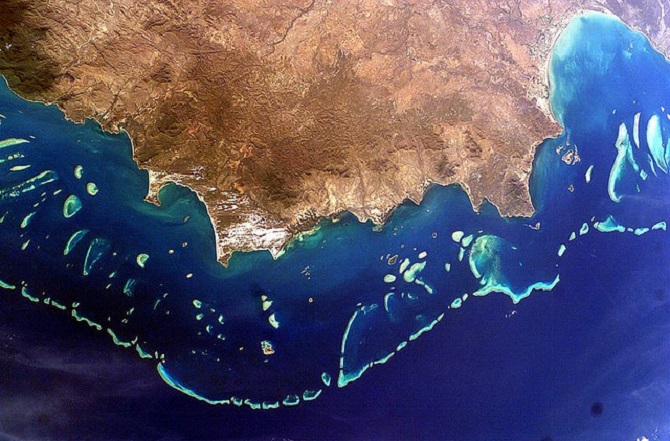
Great Barrier Reef National Marine Park. Photo courtesy of eutrophication&hypoxia.
Great Barrier Reef National Marine Park
Internationally celebrated as the world's largest coral reef collection, the Great Barrier Reef National Marine Park in Queensland, Australia attracts millions of visitors a year. With 1,800 varieties of fish and 350 species of coral in all different shades and sizes, these 2,900 reefs contain millions of moments for you to savor. You can explore the saffron, peach, and lilac carpet of coral that lies a few feet below the waves of the Coral Sea on a boat tour. In the middle of the Coral Sea put on flippers and join the aquatic world of the Clown Fish, Angelfish, and Surgeonfish. Just don't let the tour company forget you amiss those colorful fish; there are 125 species of sharks in them there waters.
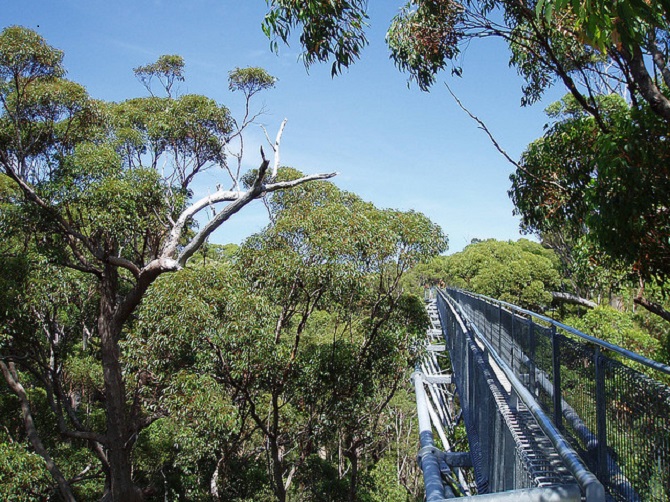
The Tree Top Walk of Walpole-Nornalup National Park. Photo courtesy of Amanda Slater.
Walpole-Nornalup National Park
During an adventure at Walpole-Nornalup National Park you are a bird enjoying the majesty of the Tingle tree canopies, 131 feet (40 meters) off the ground on a raised steel pathway in the Valley of the Giants. The Red Tingle is a variety of eucalyptus tree characteristic of the Walpole-Nornalup National Park area, and has been known to reach a height of 230 feet (70 meters). The Valley of the Giants also accommodates its ground-loving visitors with the Ancient Empire Walk, an elevated walkway intertwining between the thick ruddy trunks of these Tingle titans. A natural hum reverberates through the air here, conducive for pondering the universe. Fantastically, these dramatic points of view were created to preserve the forest floor's delicate ecosystem.
Utah
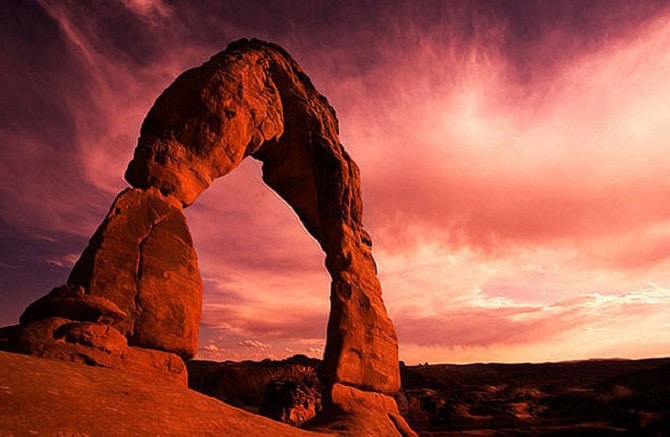
Arches National Park. Photo courtesy of Chase Lindberg.
Arches National Park
Celebrate the shapes of nature with Arches National Park in Moab, Utah. The milky white yucca blossoms, and yellow and pink parsley buds contrast dramatically with the massive red rock desert landscape. Juniper studded hiking trails dot the landscape of this curvaceous national park.
Being a swinger gets a whole other meaning here at Arches National Park, as rope swingers tether themselves to the top of the sunset pink Corona Arch and throw themselves over the edge of the 140-foot (43-meter) tall arch, flying through its 105-foot (32-meter) opening. Youtuber devinsupertramp shows the "World's Largest Rope Swing" in action. If you dare try this, keep in mind you're responsible for your own safety, as this is a dangerous and unsupervised activity.
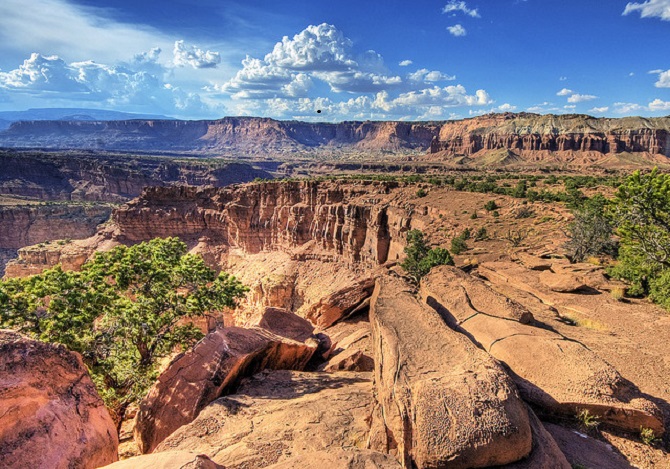
Capitol Reef National Park. Photo courtesy of Wolfgang Staudt.
Capitol Reef National Park
Capitol Reef National Park is evidence of a geologic monocline, or a fold in the earth. It stretches for nearly 100 miles (160 kilometers), leaving the west side close to 7,000 feet (2,134 meters) higher than the matching stratigraphic layers east of the wrinkle. Early settlers called the fold a reef, inspiring this lopsided park's name. In late summer the park fills with the appetizing scent of ripe fruit from the bounty of apple, pear, peach, cherry, apricot, plum, and mulberry orchards, ripe for the picking come harvest time. The national park's website boasts several petroglyph panels designed on once-bare rock by the ancestral Puebloans and Fremont societies.
Croatia/Slovenia
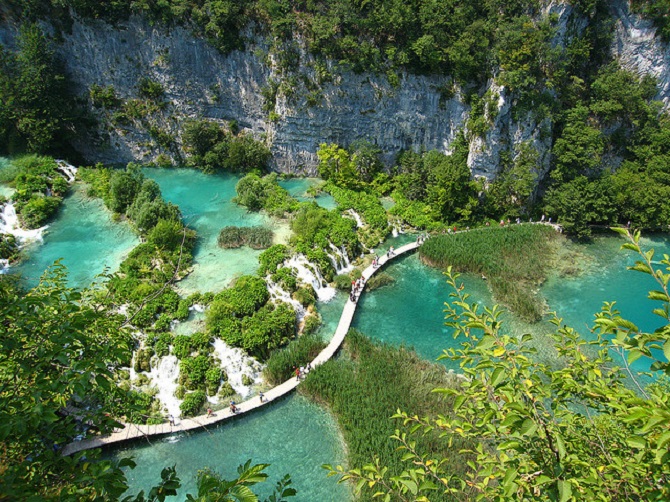
Plitvice Lakes National Park. Photo courtesy of 29cm.
Plitvice Lakes National Park (Croatia)
First described to me as having the very essence of 'The Garden of Eden', Plitvice Lakes National Park strings together a glorious color spectrum of 16 aqua and emerald lakes. Mala Kapela Mountain and Pljesevica Mountain protect the waterfalls of the upper lakes and the sparkling shallows of the lower lakes. Let the trickle of the streams, the thunder of the waterfalls, and the smell of wet dirt and moss transport you away from the 21st century. As in the Ancient Empire loop of Walpole-Nornalup National Park, the lakes' sensitive environment is protected by a platform boardwalk, encouraging visitors to appreciate Plitvice's landscapes and wildlife. Being the archaeology nerd that I am, the Japudic prehistoric settlement underneath the town of Plitvice and Bronze Age artifacts make this park even more of an unique place for me.

The Julian Alps of Triglav National Park. Photo courtesy of 29cm.
Triglav National Park (Slovenia)
Boasting the tallest mountain of the Julian Alps, Mount Triglav is the star of Triglav National Park. Triglav National Park's website retells the 1777 climb of Balthasar Hacquet—a famous mountaineer—who became the first person to endeavor to climb the soaring peak. Consequentially mountaineers have not stopped visiting since. While here, you should also see Blejski Vintgar—a vast gorge separated by the Radovna River—and descend into Triglav's flowered mountain valleys. Six hiking trails unlock Triglav's beauty, crossing near various natural points of interest, such as the glistening Peričnik Fall on the Triglavaska Bistrica Trail. Another trail worth the trek is the Goreljek Peat-Bog Nature Trail, a rare European environment route that calls attention to the preservation of this murky land of undead vegetation. Triglav is the only national park in this small south-central European country and holds 4% of Slovenia's lands.
India
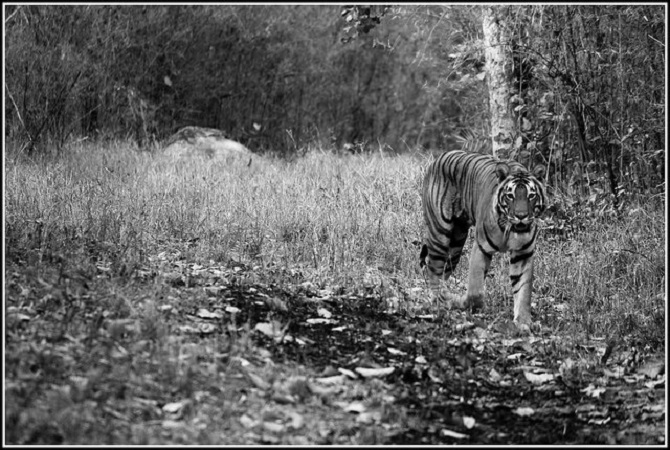
A roaming tiger in Kanha National Park. Photo courtesy of sankarshan sen.
Kanha National Park
Let's celebrate three types of art at Kanha National Park—the calls of the wildlife, their dusty habitat, and the novel inspired by them—Rudyard Kiplings's "The Jungle Book." Imagine hearing the sounds of Kanha National Park rise up around you as you transverse the park—a tiger's roar followed by the buzz of its prey's scampering feet, or an elephant trumpeting in the distance. The bamboo and sal tree forests as well as the grasslands of Madhya Pradesh make up the preserve, home to several native Indian animals. Exalted for its excellent conservation methods and tiger reserve, Kanha acts as sactuary for tigers, swamp deer, Asian elephants, black buck, peacocks, and many more native birds and mammals. The Bamni Dadar (Sunset Point) has a magnificent view of the blazing gold sunsets of Kanha, from which all visitors should conclude at least one day.
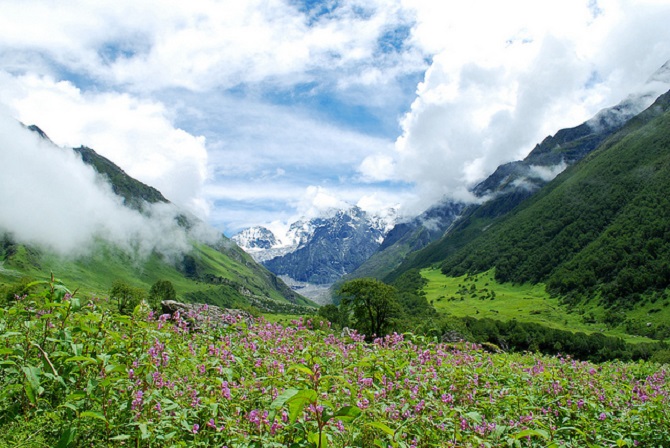
Valley of the Flowers National Park. Photo courtesy of Alosh Bennett.
Valley of the Flowers National Park
Tucked away in the Himalayas of Uttaranchal, the Valley of the Flowers National Park stands unparalleled in India. Although the Valley of the Flowers is well known, I have to list it as a off-the beaten-path park, because there are only two ways into the park to experience its 650 varieties of flowers: hiking and by an attractively perfumed mule (here's to hoping). And for that reason many people miss out on this summertime haven of 21,621.7 acres (87.5 square kilometers) of glorious flora, ranging to the soft cerulean of the Blue Poppies to the deep ruby forked petals of the Cobra Lily and creamy star-like Brahmakamal. Whispers surrounding this valley say that when all is still and there is not a soul in sight, fairies flitter among the flowers. To feel the residual magic of these fairies visit the Valley of the Flowers in May through September when the park is open.
I hope I have introduced you to a new park and you were reminded of the living art all around you.
What are your favorite famous or obscure national parks? Please share in the comments below, or post a picture of your favorite park on Epicure & Culture's Facebook or Twitter.
Also Check Out:
Ethical Travel: 3 Sustainable Stays In Kerala, India
Earth Lodge: A Soul-Finding Farmstay In The Mountains Of Guatemala
Silent Valley National Park In Kerala, India
The post Natural Art Around The World: A Pairing Of Unknown And Famous National Parks appeared first on Epicure & Culture.